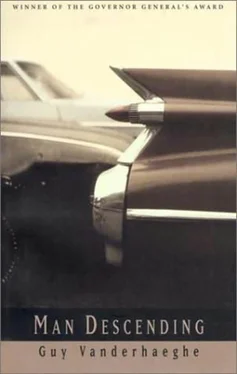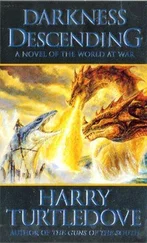“You think I don’t know that,” he had replied with a tight, pinched laugh. “What kind of fool do you think I am?”
Studying his face in the mirror he was puzzled by the mystery of how he had been able to believe in his supposed good looks, even for a second. Evidence to the contrary stared out at him from the mirror as it had every one of those mornings forty-five years ago as he had so carefully shaved.
Of course, age hadn’t improved him. But, by and large, it was the same old face, only a little more used up. An indifferent kind of face: mild blue eyes which in a certain light appeared unfocused; a limp mouth which he often caught himself breathing through; a decent, ordinary, serviceable nose for a decent, ordinary face; and a set of small, neat ears which lay close to his skull and gave him the surprised look of a man caught in a fierce wind.
Perhaps it was from the moment he realized what he was in comparison with what he hoped to be that he turned in upon himself. And although he bore no resentment against his sister for planting the seed that flowered in his humiliation, he always sensed that the story of his life might have been very different if she had never said what she had. Not better, only different.
After all, he did not renounce all of what he had come to be; that would have been an admission that everything stemmed from self-delusion, and he was too proud to do that. The sideburns disappeared and the never-to-be-completed edifice of his pompadour crumbled from neglect, but the elastic-sided boots and the trips to the barber endured.
Nor did he dare court the local girls, imagining that they scorned the memory of his debonair days and thought him a poor thing, likely simple. Yet when the chrome-backed hairbrushes he had ordered from the catalogue finally arrived, he hadn’t returned them and requested a refund. He was not quite the same young man he had been before his twenty-first birthday.
“What are you doing?” said Little Paul again, with greater emphasis.
“I’m going to brush my hair,” Tollefson told him, cocking his head and looking at himself in the glass from a different angle.
“And then what?”
“I’ll get myself ready for breakfast. Like you should. I’ll wash my face and hands.”
“Why?”
“Cleanliness is next to godliness.”
“Why can’t I come to your room without knocking?” the boy asked again.
“Because I might be doing something I don’t want anybody to see.”
“Like what?”
“Praying. Having my private talks with God that nobody has any business butting into,” said Tollefson sternly. “For Jesus told us: ‘When thou prayest, enter into thy closet, and when thou hast shut thy door, pray to thy Father which is in secret; and thy Father which seeth in secret shall reward thee openly.’ ”
“Here? In this room? God would come here in this room?” the boy said excitedly, his fingers digging and twisting at the crotch of his pyjamas. “Come here and talk to you?”
“Yes, in a way He would.”
Little Paul thought for a moment, sucking his bottom lip. “I don’t believe you,” he said. “God wouldn’t fit in such a little room. Jesus might fit, but not God.”
“Same thing, son,” said Tollefson, slipping into his shirt.
Little Paul appeared to be sceptical of Tollefson’s contention, but he let the subject drop. “My dad’s buying you pigs,” he informed the old man.
“That a fact?”
“Can I help you look after them pigs?”
“You can if you promise not to come here in my room without knocking any more.”
“All right.” He climbed on to the bed and crossed and locked his legs.
“Why don’t you go to the bathroom, son?”
“Don’t need to.”
“Suit yourself. But no accidents on my bed, eh?”
Little Paul giggled at the idea. Somehow Tollefson heard this as a plaintive sound. The boy didn’t seem to have acquired the knack of laughter. Tollefson began to do up his shirt.
“Why did you come here?” the boy asked abruptly.
Tollefson paused at his collar-button. He always did up his collars. He was that kind of man. “I never thought about it,” he said. “I suppose because there was no place else to go.” He considered further. “No, God brought me here,” he decided at last.
“To die in this upstairs bed,” added Little Paul conversationally, patting the bedclothes with a hand crusted with eczemic lesions.
That terrible spring Big Paul often inquired of Tollefson, “Did you bring this goddamn miserable weather with you, or what?” He made a point of the goddamn, always careful to stress it after he learned from Lydia that her uncle had turned “churchy” some time during the past twenty years.
“I don’t remember hearing anything about his being religious from Mom,” she said. “He didn’t catch it from home; I know that for sure. Grandpa Tollefson’s acquaintance with church was of the marrying and burying variety.”
“Why do they have to creep?” said Big Paul. “He minces around like he was walking on eggs. They all walk the same and they all talk the same. They’re so jeezly nice . I never thought there’d come a day when I’d have to sidle past some creeping christer slipping and sliding around my house.”
“There’s nothing the matter with religion,” declared his wife. “You could do with a little yourself.”
“What really frosts my ass about guys like him,” said Big Paul, who found anything out of the ordinary offensive, “is they got no idea of what’s normal . Take him. He wouldn’t say shit if his mouth was full of it. Yesterday he fell down in that slop in the corral. Know what he says?”
“Can’t imagine.”
“ ‘Oh Lord, how long?’ he says. ‘How long what?’ I asks. ‘Oh Lord, how long will it rain?’ he says, and then laughs like he was in his right mind. That’s his idea of a joke!”
“If God happens to answer his question, let me in on the secret,” said Lydia. “I want to hang washing some time this week.”
But April was not a month to hang washing. April was a month of cruel rains. The eaves on the house choked on ice water; the poplars behind the cow sheds glistened in an agony of chilling sweats; and sparrows shrank to black clots of damp feathers which rode telephone wires that vibrated dolefully in the wind.
Big Paul’s farmyard swam in water. The early calves were dropped from the warm bath of the womb into numbing puddles – where four drowned before they found the strength to gain their feet. Others shook in the steady drizzles until they contracted hemorrhagic septicemia, shat blood, and died between their mother’s legs.
Under the pressure of circumstances, Tollefson tried to do more than he was capable of. The muck in the corrals sucked the strength out of his legs and left him trembling from head to foot, his single lung straining, the blood surging in his temples. When the old man stumbled in pursuit of new-born calves, his mouth gaped in a mute appeal for oxygen; his breath was barely visible in the cold as a thin, exhausted vapour. The wound on his back became a fiery letter, and one grey day in the mindlessness of utter fatigue, trying to wrestle a struggling calf to shelter in a pelting rain, he found himself muttering over and over, “L…, L…, L…,” in cadence with the thrumming of the blood in his ears and scar.
In mid-month, on April 18, the temperature dropped and the rain resolved itself into a stinging sleet which came driving out of a flat, impassive sky and froze to whatever it struck. Fence posts were sheathed in ice; barbed wire turned to glass, its spikes to frosty thorns. The cattle humped their backs to the bitter onslaught and received it dumbly, until their coats crackled when they stirred uneasily during lulls in the wind.
Читать дальше












